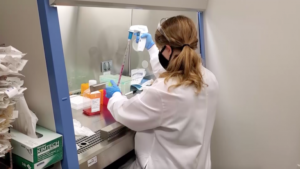 Hi, I’m Casia Wardzala, a PhD student in the BME department. I study mucins and their effect on viral infectivity and overexpression in cancer in Dr. Jessica Kramer’s lab. I have ADHD – specifically Type I ADHD, the predominantly inattentive type. I struggle to focus. But that doesn’t mean I am not highly intelligent. It is a common confusion that people with ADHD are not smart when in fact, it’s often the complete opposite. How about the classic example that Albert Einstein had ADHD? Case closed.
Hi, I’m Casia Wardzala, a PhD student in the BME department. I study mucins and their effect on viral infectivity and overexpression in cancer in Dr. Jessica Kramer’s lab. I have ADHD – specifically Type I ADHD, the predominantly inattentive type. I struggle to focus. But that doesn’t mean I am not highly intelligent. It is a common confusion that people with ADHD are not smart when in fact, it’s often the complete opposite. How about the classic example that Albert Einstein had ADHD? Case closed.
So, how does this learning disability impact my life? In grad school, where work is self-driven and requires high levels of organization, I often feel like my own mind is setting me up for failure. I process things more slowly, so answering questions on the spot is tough. I need a lot of preparation for presentations. I have trouble juggling multiple tasks. I also have what I call “bad brain” days where no matter how hard I try I can’t seem to focus long enough to get anything done. I write a lot of sticky notes and lists to try to stay organized, but sometimes these coping mechanisms either don’t happen or don’t work. I do better with small goals and deadlines that eventually compile into one big goal. I often need more time to complete tasks than the average person and being in an environment without distraction helps enormously. What I’m trying to say is – it’s an everyday struggle. Despite this, I have developed coping strategies that allowed me to become an award-winning researcher.
I am an example of the importance of giving students like me accommodations. When I was first diagnosed with ADHD as an undergrad, I got testing accommodations such as a quiet room and extra time. I can’t put into words how helpful this was; it let me excel and reach a higher potential. Mentors and professors, please explore more resources on the individual needs and accommodations people with ADHD need to be successful.
What I would ask more than anything is not to stigmatize me. According to the psychiatrist who first diagnosed me, I have the “airheaded” type of ADHD. So yes, this learning disability is still very much stigmatized, even by health care professionals. It’s hard not to take that personally. However, there are actually a lot of great things about having ADHD. Hyperfocus. Resiliency. Creativity. It’s such a big part of my personality, and I wouldn’t be who I am without it. And I wouldn’t want to be. Weird as it is to say, I like my disability (at least most of the time).
—
The Biomedical Engineering Disability Spotlight is an initiative spearheaded by the Equity, Diversity, and Inclusion Committee in the Department of Biomedical Engineering that aims to provide unique insights from those with disabilities working within our academic community of students, staff and faculty.